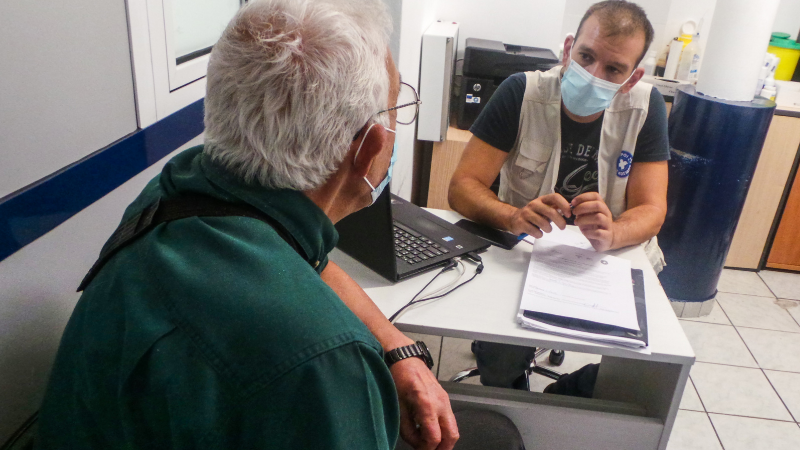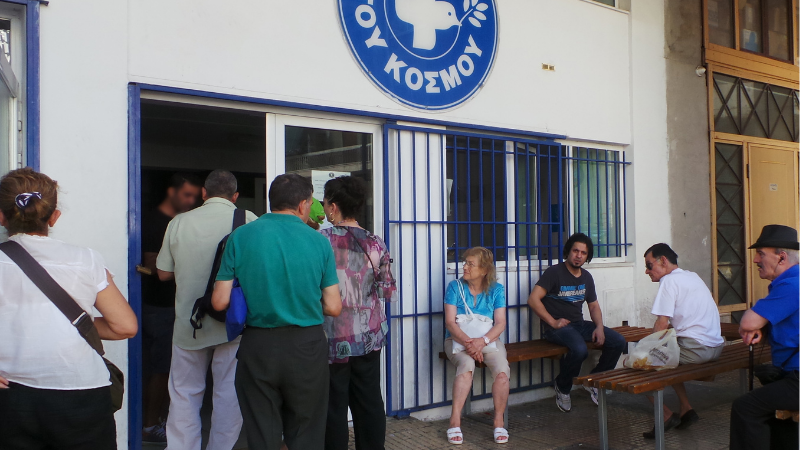THI Australia Athens public health project providing critical care
September 23, 2020
In the first three months of THI Australia’s public health project with Doctors of the World (MdM Greece), more than 960 people have received access to free medical care at the Athens Polyclinic, leading to lifesaving diagnoses and treatment.
For “Vasilis,” a referral to the Athens Open Polyclinic for deteriorating eyesight turned out to be a lifeline. The 69-year-old retired engineer had struggled to access the public health care system and navigate the voice-activated Health Line to make hospital appointments for routine health checks.
After a social worker referred him to the clinic run by Doctors of the World Greece (MdM Greece) to get his eyes checked, Vasilis became one of the first patients treated under a 12-month public health project being funded by THI Australia.
Initial examinations by a physician, cardiologist and ophthalmologist, discovered that Vasilis had Type 2 diabetes. The ophthalmologist found that he suffered from cataracts and diabetic retinopathy, with an imminent risk of total blindness if the diabetes was not regulated. Vasilis was immediately prescribed medication, supplied free of charge by the clinic.
The cardiologist also diagnosed that Vasilis suffers from dangerously high blood pressure and recommended hospitalisation. He was fitted with a pacemaker and required medication and ongoing monitoring following his surgery.
Vasilis was one of 964 disadvantaged and vulnerable people able to access medical care at the Polyclinic in Athens in the first three months of THI Australia’s public health project, supported by the Berbatis family.
Living alone in a small apartment in central Athens, Vasilis survives with little money and the half-pension he receives is not enough to cover his ongoing medical needs.
With no family to help him deal with the public hospital system, MdM’s social service has undertaken to regularly connect him with the medical services in public hospitals and support him with counselling.
Every time he comes to our polyclinic, he tells us that we are his only help with the health system, since he is unable to arrange an appointment at a hospital on his own nor get his medicines,” says MdM social worker George Bakkas.
“Many times, after the examination in the hospital, he comes to our polyclinic to get the medication he has been prescribed, as he is unable to cover the purchase of the necessary medicines from private pharmacies, which usually exceeds 70 euros monthly.
“His frustration with the system leads him to not follow the medical instructions with an immediate risk to his health and there is a real risk of being left homeless, due to his inability to self-care.”
The MdM Polyclinic plays an integral role in supporting vulnerable people to access medical care.
Under the THI Australia’s public health project, the clinic conducted more than 3,700 consultations and provided pharmaceuticals to 540 patients between 1 June-31 August 2020. Many of the patients were referred by homeless shelters, community shelters and municipal services from disadvantaged areas of the Attica region.
More the half the patients examined were children under 18, with a large proportion treated for Infectious diseases requiring immunisation. For those over 60, the most common treatment and medication required was for hypertension, cardiovascular disease and diabetes.

